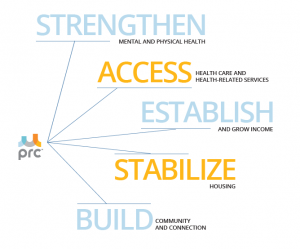When she was referred to PRC’s Co-op Supported Living Program by a city clinic, Kathy—a 53-year-old Korean-American woman who moved to the US when she was two—was living with and working as her ailing mother’s caregiver. Kathy had been diagnosed with schizophrenia in her late 20’s following methamphetamine use during graduate school. Since then, she’s battled with delusions and paranoia, had bouts of homelessness, and utilized crisis services in San Francisco from 2014 to 2019.
Now, knowing her mother only had months to live, Kathy had been informed she would become homeless once her mother died. The apartment she was living in was provided for her mother. Kathy was an only child with no familial support, and this news ushered in a critical time for Kathy’s continued health and stability.
PRC’s co-op apartments are designed to provide a transitional, supportive environment for people at a short remove from vulnerability, where supportive resources, a little time, and confidence-building practice will equip them to effectively manage their health conditions into the future and take the next steps into health and independence successfully.

Inside PRC’s co-op program, Kathy attended support groups, house meetings, and weekly individual rehab sessions as well as an external skill-building group. She continued to nurse her mother until her mother’s death, and Kathy utilized her new-found supportive community to grieve without utilizing crisis services.
Kathy’s focus and hard work continued to pay off when she was able to apply for and successfully achieve a federal housing voucher in Colorado. After five months in PRC’s co-op, with the help of her case manager and PRC’s community partners Kathy moved out and across the country into her new 2-bedroom apartment.
Given the Bay Area’s high costs of living and dearth of affordable housing options it’s true that taking the next step into independent living and self-driven follow up care is increasingly difficult for co-op residents. Leaving San Francisco can mean leaving one’s support network behind. Housing resources that keep people healthfully in community, like each of PRC’s 111 existing co-op beds, are critical.
Kathy demonstrated insight, resiliency, and self-advocacy that only continued to grow as she received support and stability from all her San Francisco providers. She is a testament to the power of community, partnership, and opportunity, and we, at PRC, are grateful to have been a part of that strength.


